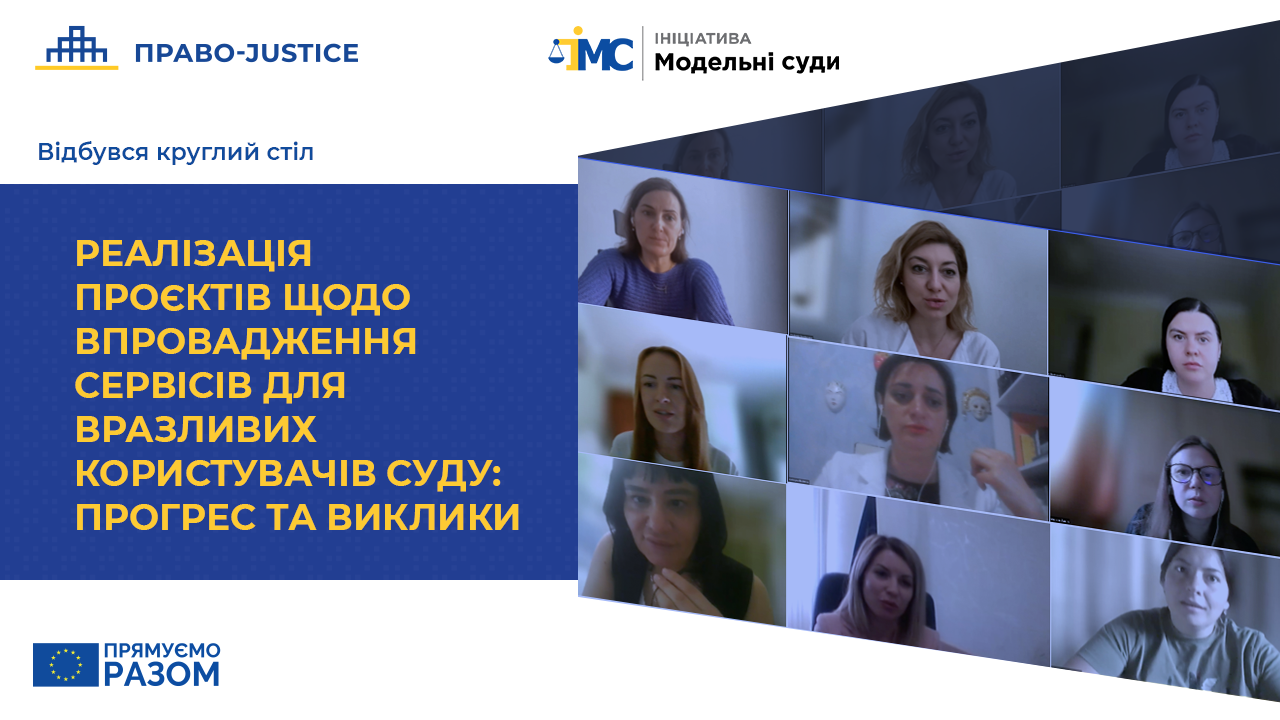Services for Vulnerable Court Users: Representatives of the Judiciary Presented Their Developments

On June 12, the EU Project Pravo-Justice organized the round table “Projects on the Implementation of Services for Vulnerable Court Users: Progress and challenges.”
At the event, the graduates of the previous waves of the training course “Training of Trainers on the Implementation of Services for Vulnerable Court Users”, which is delivered annually within the framework of the Model Courts Initiative, presented their developments.
Anna Adamska-Gallant, International Key Expert, Lead of the Judiciary Component of the EU Project Pravo-Justice, emphasized in her welcoming speech the importance of introducing proper approaches when working with vulnerable users of court services, including witnesses and victims of war crimes.
“We know that the judicial system is in a difficult situation because of the war. However, the number of vulnerable users of court services is increasing in Ukraine. Therefore, it is very important that the graduates of the course implement services for vulnerable court visitors on their own initiative. We welcome the creation of a community of professionals who will share their knowledge and best practices with other courts; support and motivate their colleagues to develop services for vulnerable visitors in their respective courts,” said Anna Adamska-Gallant.
Yevheniia Bondarenko, national expert of the EU Project Pravo-Justice, emphasized that the Project will continue contributing to the development of services for vulnerable court users, taking into account the needs of wartime.
“We are making good progress in terms of implementation of services for vulnerable court users. The graduates of the three previous waves of the course “Training of Trainers on the Implementation of Services for Vulnerable Court Users” have already implemented more than 50 projects in courts. At the same time, they showed adaptability to new serious challenges, so that their projects are optimal from the point of view of needs and resources. Therefore, the exchange of best practices, especially about how to solve problematic issues, is one of the goals of our trainers’ community,” said Yevheniia Bondarenko.
Kateryna Ilikchiieva, trainer at the course, national expert of the EU Project Pravo-Justice spoke in more detail about the results of the previous groups.
“Over the three years, more than 90 representatives of various bodies and institutions of the judicial system, public organizations, etc. became participants to the course and network of trainers. This has given a comprehensive perspective on the process of providing services for vulnerable court users,” said Kateryna Ilikchiieva.
In her turn, Irina Urumova, trainer at the course, international expert of the EU Project Pravo-Justice explained how the new curriculum has been adapted to the needs of wartime.
“The war caused very serious challenges for Ukraine’s judicial system. Therefore, the new program consider the specifics of victimization in the context of an armed conflict. We also cover the specifics of evidence collection and storage, targeted at trauma survivors. Another important update of the program is dedicated to the protection of children and prevention of criminal victimization of IDPs and refugees. There is a separate block on conflict-related sexual violence,” said Irina Urumova.
The graduates of the previous waves presented their projects: Natalia Korol, Head of the NGO “All-Ukrainian Association of Court Employees”, chief of staff apparatus of the Vinnytskyi Court of Appeal; Anna Mostetska, judge-speaker of the Ternopilskyi District-in-City Court of the Ternopil region; Nazarii Boiarskyi, representative of the NGO “Incubator of Democratic Initiatives”, Tetiana Marchenko, chief of staff of the Ivankivskyi District Court of the Kyiv region; and Oksana Pidhaina, chief of staff of the Volynskyi Court of Appeal.